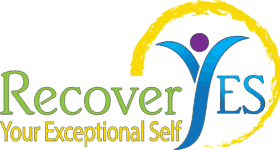Why do some people seem to overcome addiction pretty easily and others struggle with it all their lives? Well, since every one of us has different backgrounds and experience that has contributed to the development of our addictions, that’s not an easy question to answer.
Still,

There are some mistakes that are commonly made when overcoming addiction that sabotage success. And, you do want to avoid them right? If so, read on…
Mistake #1 – Playing Musical Chairs with Addiction Problems
One of the most common things we hear when working with people in addiction recovery is “I can’t stop smoking right now. I need to deal with XXXX addiction first.” It’s understandable that it seems better to deal with one addiction at a time. Unfortunately, the research is pretty definitive. To overcome addiction, the brain needs to heal and begin creating the necessary “feel good” chemicals naturally. That doesn’t happen if you’re still using any addictive substance or behavior as a “crutch”. Relapse is much more likely when the brain is still relying on any addiction to function.
What to Do Instead – This may not be what you want to hear, but stopping all addictions at the same time significantly increases your chances of long-term recovery. Optimally, this includes the usual suspects (drugs, alcohol, tobacco) AND some surprising addictions. Other addictive substances that interfere with your brain’s ability to heal include sugar and caffeine – and the Molotov cocktail of sugar and caffeine…sodas! And, at the risk of losing you right here, switching to artificial sweeteners will not improve your health – or your brain function.
Mistake #2 – Accepting that Addiction is an Incurable Disease
One of the premises of 12-step programs is the concept that addiction is a disease. I don’t necessarily disagree with this statement. The important question to ponder is whether you believe it is a “state of being” that can be passed through or, as 12-step proposes, it is an incurable disease that you will be afflicted with for the rest of your life. It has been proven scientifically that our thoughts create our reality. And, since I know that humans are complex beings that have been pre-programmed to heal, I’m not comfortable telling anyone (including myself) that they can not fully overcome their addiction.
What to Do Instead – Since this is such a controversial subject, it’s important that you develop your own approach that will help you deal with the endless opinions you will encounter. Rather than adding more stress to an already stressful situation, it can be helpful to simply say “Thank you for sharing.” Addiction is a scary thing to deal with and fear is a strong emotion. Engaging is a heated debate about your approach to recovery won’t help. Just letting the person sharing their opinion with you know that you appreciate their concern can ease the tension. And, positive self-talk can be very helpful. Remind yourself that there was a time when you were not an addict. You CAN return to that state of being.
Mistake #3 – Dealing with Addiction in Isolation
It’s been proven that people have more success when recovering from anything when they have an understanding support system to tap into. This is not unique to addiction support. Cancer patients are encouraged to join a support group with other people that are dealing with the same illness they are. Having like-minded friends around to talk to when you’re having a particularly challenging day can make the difference between sustaining sobriety and relapse. And, remember, the double-life of addiction makes you want to isolate so you’ll have lots of excuses for why you don’t need to, or want to, reach out to others.
What to Do Instead – This one can be really easy if you’ll allow it to be. There are plenty of ways to find support for overcoming addiction. The most common, and least costly, would be 12-step meetings. That can be a great place to start if you need to catapult yourself out of isolation. If your addiction problem is related to some trauma in your life (and most are), you will probably need to find a therapist that specializes in addiction recovery. It can also be helpful (and more convenient) to find an addiction recovery coach.
If you’re interested in exploring your options for help overcoming addiction, the coaching program and services at RecoverYES have been designed specifically to help you beat addiction. You can find out more here.
